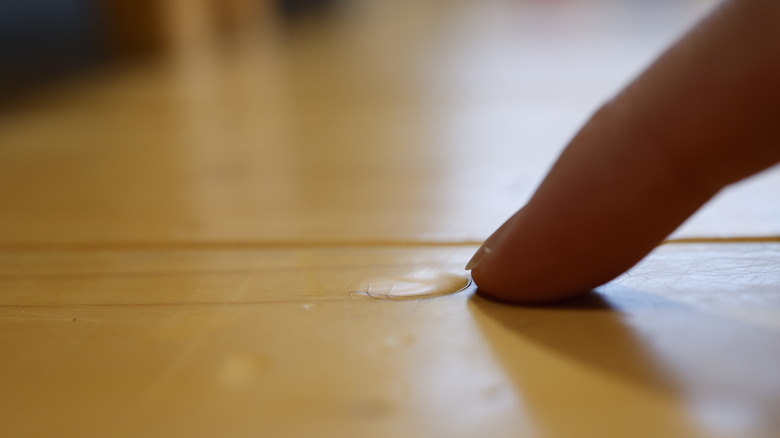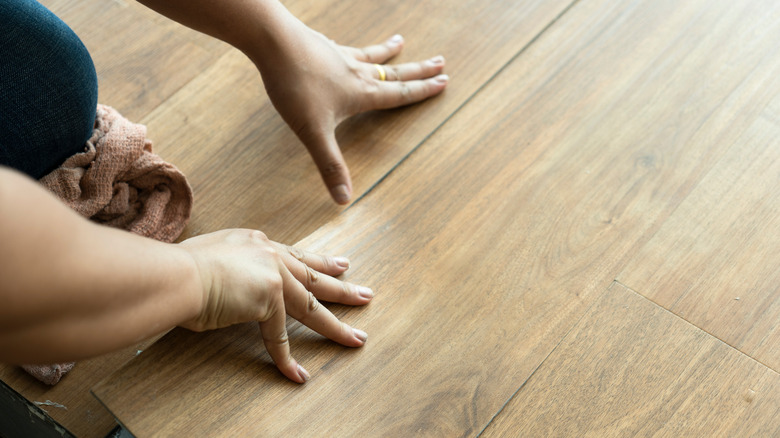Can You Fix Your Vinyl Dents With Just Water? Here's What To Know
A hack to repair dents in your vinyl floors in just minutes and at no cost — it sounds too good to be true. The hack goes something like this: Pour boiling water on the dent, cover it with a cloth, and leave it to soak for five to 10 minutes. You could also soak the cloth in boiling water and just lay that on dent. If you can't boil water, others have tried leaving an ice cube to melt on the indented area. While some people on social media have claimed success, we couldn't find any reliable evidence in favor of these hacks. While they're appealing as quick and easy fixes, their success appears anecdotal rather than guaranteed, and relying on them may even create more problems than they solve.
What we did find were multiple warnings of the damage boiling water can do to vinyl floors. Additionally, professionals advise against using boiling water directly on vinyl floors. It can weaken the adhesive under the floor and cause bubbling, wrinkling, or peeling over time. Although the cloth placed on the dent would serve to absorb any excess water, if any moisture gets between the seams, it can lead to warped planks, mildew, and discoloration. If you choose to try these hacks, regardless of the mixed bag of advice, it's worth understanding what's actually happening to your floors in the process.
How water and heat affect vinyl floors
Made primarily of PVC, a synthetic plastic polymer, vinyl flooring has a certain level of malleability, softening and becoming more elastic under heat. Pouring hot water on vinyl flooring would likely activate it, temporarily expanding with increased mobility. Cold temperatures, on the other hand, would have the opposite effect, causing the floors to contract. Theoretically, you could combine the hacks so the boiling water allows the vinyl fibers to first expand back into the dent and the ice contracts it to further reduce its size.
The quality, thickness, and type of vinyl flooring play a role in how this works, too. In thin vinyl sheets, any DIY repair hack is less likely to restore the floors entirely. These are generally more prone to damage, one of the disadvantages to vinyl sheet flooring, and are notoriously difficult to repair. Luxury vinyl plank (LVP) and luxury vinyl tile (LVT) are easier to repair and have a thicker wear layer that protects them from further damage.
Better ways to repair vinyl floors
The limited evidence for water-based hacks may be disappointing, but there are other ways to repair vinyl floors, depending on the type and extent of the damage. Try repairing vinyl flooring using an iron or a hair dryer as an alternative, gently heating the vinyl to avoid melting, warping, or other damage from excessive heat. Damaged vinyl planks and tiles can be individually switched out and perfectly matched with new ones. Another option is to fix the dent with wood filler or a dedicated vinyl repair kit. Do make sure the damage you're looking at is an actual dent and not a chip in the surface, as fixing your vinyl flooring that needs a chip repaired looks a little different.
After going to the trouble of fixing your vinyl floors, you probably won't want to deal with this a second time. Instead of finding the right hack to repair your vinyl in the future, there are certain things you should never do if you have vinyl floors, such as frequently exposing them to high heat and moisture or too much sunlight. Taking good care of your floors is the best way to avoid repairs in the future.

